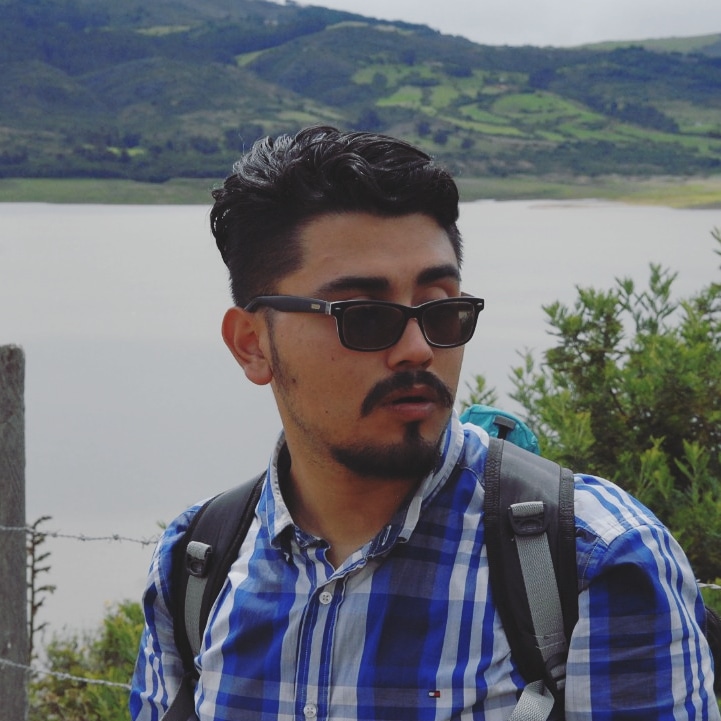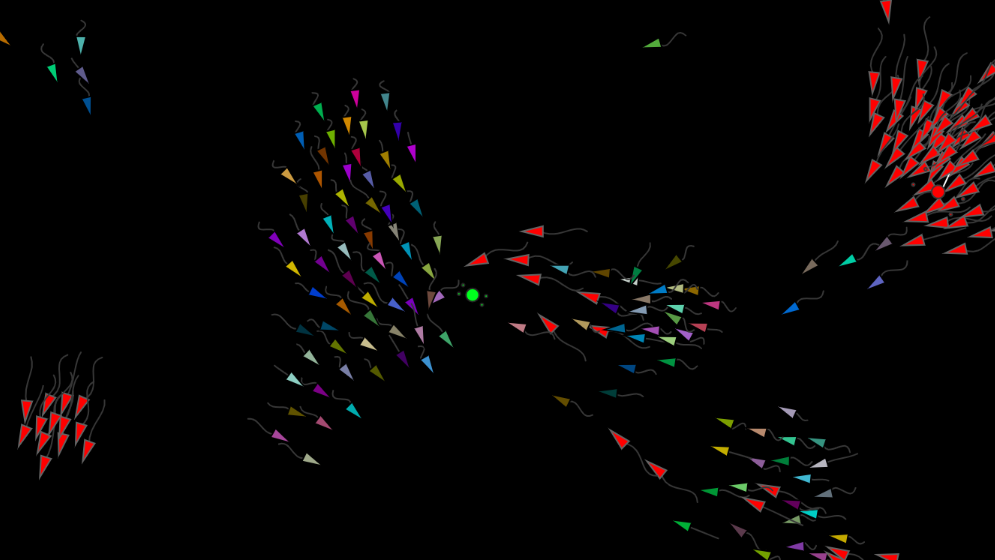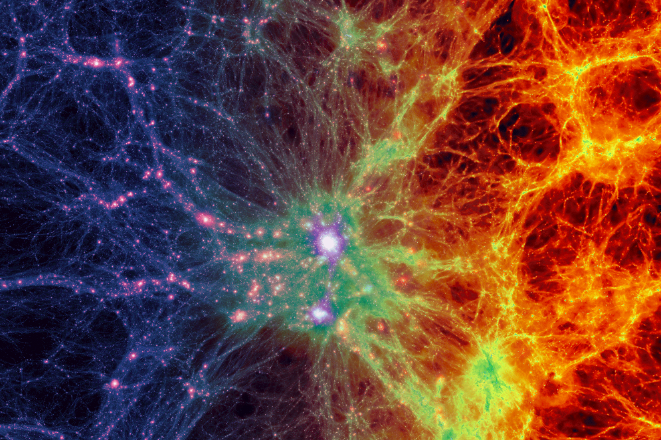Hi! I am David Paipa: Colombian astrophysicist, pasionate programmer and amateur artist. .
I am currently doing my Doctorate in heliophysics at the observatory of Paris. My current project at LESIA involves analyzyng data from the solar Orbiter probe (launched in February 2020) with the purpose of understanding particle acceleration in the corona during solar flares. My recent research experience in phyisics has been oriented towards studying the properties of highly energetic (HE) astroparticles (detection, statistics and dat analysis techniques, HE astronomy, ISM chemistry). In addition, I have 4+ years of experience in the application of scientific computing, development of AI architectures and database management in academic and industrial contexts. I'm interested in scientific research through the implementation of bayesian models and deep learning techniques. Data visaulization, juggling and genetic algorithms implementation are current learning goals .
- Science & Data: numpy, pandas, collections, os, string, scipy, astropy, sunpy
- Plots: matplotplib, seaborn
- Machine Learning (ML): scikit-klearn, Tensorflow , Keras, OpenCV, Word2Vec
- Text scrapping and Language Processing: string, BeautifulSoup, spacy, nltk
- UI: pygame, tkinter, pyautogui
- Plots: matplotplib, seaborn
- Backend: node, Angular , Express
- Data Base: mogoDB
- Machine Learning: ml5, TensorflowJS
- Creative: processing, p5, matter
- Plots: D3
- Development: Postman, Jupyter, Microsoft/Libre Office
- Used languages: SQL, SAS, Addactis
- Machine Learning: Runway, Teachable Machine
- Technologies: Git, Makefile, R, Java, Jekyll, LaTex
- Astronomy: IRAF
Frebruary 2022 - July 2022
The sun is an active and magnetic star and is the main source of electromagnetic radiation, intense fields and energetic particles in the solar system. Its intense magnetic fields store energy that can be released during solar flares. One of the current objectives of the Solar Orbiter (SO) launched in February, 2020, is to understand the mechanisms by which the solar flares produce energetic particles and radiation that fill the heliosphere. By having remote and in-situ instrumentation, SO will be able to observe the effects of solar flares in the low corona and measure the related changes in the heliosphere. In this work, we use data from the STIX (remote-sensing, X-ray telescope/imager) and RPW (in- situ, Radio and plasma waves) instruments to perform a X-ray and Radio diagnostics of a solar flare event on the 17 July 2021: Within the duration of the event Interplanetary Type III bursts are observed as well as photon counts up to 80 keV. Spectrospcopy and Imaging of the X-ray sources in the low corona provide an insight of what seems to be accelerated electrons due to an interchange reconnection event, while Radio analysis allow to analyze the weakly relativistic velocities of electron jets escaping into the interplanetary medium. Supervisor : Dr. Nicole Vilmer and Dr. Milan Maksimovic
Paris, France
October 2021 - December 2021
When trying to understand the conditions on the interstellar clouds, simulating the chemical evolution implies solving stiff systems of ODE’s which increase drastically the computation time as we consider bigger chemical networks. In particular, coupling this with 3D MHD simulations imposes an impossible computation task with state-of-the-art technology. In this work, we explore the chemical processes occurring in the ISM with the help of CHIMES, a code for simulating the evolution of chemical networks, for a network with 135 species. Then I use the generated data to train a functional autoencoder capable of compressing the information of the chemical network into a 5D latent space, and decompressing any latent representation to retrieve the chemical information. Following the same architecture and metrics as the mentioned publication I obtain a good performance despite having a bigger network, and the reconstruction of key species is good enough to describe important processes in the evolution of Dark clouds in interstellar space. Supervisor : Dr. Franck LePetit
Paris, France
April 2021 - June 2021
The LHAASO experiment has been operative since 2018, showing new data of the High Energy Universe by detecting at ground level the particles produced by High Altitude particle showers. This showers are produced by the interaction of highly energetic particles with the molecules of the high atmosphere, with collision energies of thousands of GeV in the center of mass. The classification of these events according to their primary particle and energy regime is a priority for understanding the sources that accelerated these particles, so a method of classification must be proposed in order to obtain objective observation data. We focus on obtaining data of gamma induced showers (GS) to develop astronomical studies in the high energy tail of the spectrum. For understanding better this problem, many particle showers are simulated with CORSIKA in conjunction with a simplified model of the LHAASO detectors, generating examples of data obtained by the observatory. A Machine Learning model is proposed and trained with the generated examples in order to classify any new data set of examples, favoring the detection and discard of non-gamma induced particle showers (PS). A semi-empirical Logistic model of classification is evaluated, obtaining classification error rates beteen 0.1% and 15%. Supervisor : Dr. Andrii Neronov
Paris, France
April 2019 - August 2020
My job consisted in proposing strategic models to approach problems that involved databases of external clients, implementing Data Science techniques and Machine Learning models without leaving aside the model interpretation. My responsibilities included developing and advising projects in Biometry, Natural Language Processing and Financial predictions, obtaining performances between 65% - 80% accuracy within the first 6 months of implementation.
Bogotá, Colombia / São Paulo, Brazil
August 2016 - November 2018
I worked as an Assistant for different courses and learning spaces at the university. My responsibilities varied according to the space, from carrying out administrative tasks of the course (such as grading homeworks and managing platforms), to the accompaniment in class and the teaching of class topic to the attending students. I supported courses and learning spaces like:
- Electronics (Analogical and Digital circuits, logic and phasors, Arduino)
- Algorithms and Programming focused on objects (Java, Eclipse)
- Thinking through Numbers (Numerical Sequences, Mathematical puzzles)
- Phyisics Learning lab "Clinica de problemas" (Classical mechanics, electrostatic, Modern physics)
- Centre for success in sciences "CexCi" (Linear Algebra, Calculus, Classical and modern Physics)
Bogotá, Colombia
Universidad de los Andes
After a year of volunteering I was selected to perform the Leadership role in the program I was working then. I was in charge of the integration activities and social events planning, volunteer managing and general leading of the program. ANDAR is a student organization whose objective is to help first semesters scholarship students with dropping-out risk to have a smooth and enjoyable integration into university life.
August 2016 - May 2017
2022 - current (2025)
Observatoire de Paris - LESIA - ED127
Continuing the project I developed for my M2 internship, our objective is to perform a statistical analysis on various solar flare events observed by Solar Orbiter (and other observatories if possible). This porject is developed at LESIA under the supervision of Dr. Nicole Vilmer and Dr. Milan Maksimovic
2021 - 2022
Observatoire de Paris - PSL
For my M2 in Paris I chose a major in observational astrophysics, in which I Learned about current active research topics in astrophysics, state-of-the-art instrumentation and how to use the data it gathers. Different courses 2-week courses were given by active researchers from well-known laboratoires in astrophysics associated with the Paris observatory (LESIA, LERMA, LUTH, IAP, ...). During my courses I did a short project with LERMA (Lab Isertion Unit) associated with the ISM chemistry, and my internship (degree work) at LESIA studying solar flares using data from the Solar Orbiter Mission. Learn More
Relevant courses:
- Data Analysis Wavelet transform, plasma physics, X-ray spectroscopy, radio imaging, Asteroseismology, spectropolarimetry
- Instrumentation and observation interferometry, adaptive optics, coronography, optic/IR telescopes, photometry, Allan deviation
- HPC/HPDA Parallelization (OpenMP,MPI), neural networks, spectral decomposition
- Exoplanets Radial velocity, transit, direct imaging and microlensing detection techniques
2020 - 2021
Sorbonne Université (UPMC) - Université de Paris
M1 in fundamental physics in Paris, France. I focused my formation in astrophysics, developing at the end as degree work an internship in APC laboratoire. My internship focues on the detection and clasification of high-energy cosmic particle events. Learn More
Relevant courses:
- Astrophysics and Cosmology Stellar evolution, thermal history of the universe, ISM, astronomy
- Particle physics Feynmann diagrams, quantum number conservation, relativistic collisions, standard model
- Quantum Mechanics Theory on Quantum Mechanics, lie algebra and conservation, operators, quantum entropy
- Statistical physics Thermodynamics and statistical ensembles, ergodic systems, quantum gases, BE and FD statistics
- Atomic and molecular physics Electronic transitions, atomic orbitals, molecular orbitals, radiation in atoms, complex atoms
- Complex and macroscopic systems Fluids, viscosity, Non-newtonian fluids, intermolecular forces
2015 - 2019
Universidad de los andes
I studied my university degree in physics in the city of Bogotá, Colombia. I worked a part of the degree in quantum optics and high energy physics exploring the wonderful topics they have to offer, however I finally dedicated myself to the study of cosmology through computational methods. I am currently an active member of the Computational Astrophysics group (AstroAndes) and the Optics Group & OSA chapter (GOA) at Universidad de los Andes.Learn More
Relevant courses:
- Open Clusters Astronomical observation techniques and images processing
- Modern Cosmology Theoretical and historical review of Cosmology
- Quantum Mechanics & Particle Physics Theory on Quantum Mechanics and introduction to QFT
- Statistical Physics Thermodynamics and statistical ensembles
- Advanced Computational Methods Algorithms and Data processing applications in science
2020
Coursera - Deeplearning.ai
As especified by the certificate: The Deep Learning Specialization is designed to prepare learners to participate in the development of cutting-edge AI technology, and to understand the capability, the challenges, and the consequences of the rise of deep learning. Through five interconnected courses, learners develop a profound knowledge of the hottest AI algorithms, mastering deep learning from its foundations (neural networks) to its industry applications (Computer Vision, Natural Language Processing, Speech Recognition, etc.). The 4-week courses approved included:
- Neural Networks and Deep Learning
- Improving Deep Neural Networks: Hyperparameter tuning, Regularization and Optimization
- Convolutional Neural Networks
- Sequence Models
- Structuring Machine Learning Projects
MNRAS Letters (co-author)
Superclusters are a convenient way to partition and characterize the large scale structure of the Universe. In this Letter we explore the advantages of defining superclusters as watershed basins in the divergence velocity field. We apply this definition on diverse datasets generated from linear theory and N-body simulations, with different grid sizes, smoothing scales and types of tracers. From this framework emerges a linear scaling relation between the average supercluster size and the autocorrelation length in the divergence field, a result that holds for one order of magnitude from 10 Mpc/h up to 100 Mpc/h. These results suggest that the divergence-based definition provides a robust context to quantitatively compare results across different observational or computational frameworks. Through its connection with linear theory, it can also facilitate the exploration of how supercluster properties depend on cosmological parameters, paving the way to use superclusters as cosmological probes.
October 2020
- Ser Pilo Paga I (2015, Colombia) : Scholarship awarded to the 10,000 best high school students in the country to complete their undergraduate studies.
- Colfuturo (2020, Colombia) : Meritorious scholarship awarded by the Colfuturo Foundation to outstanding university students to complete their postgraduate studies abroad.
- Sorbonne Scholarship (2020, France): financial aid granted to foreign students to complete their studies.
- Bourse Jean-Pierre Aguliar CFM (2022, France): funding granted to outstanding research projects in france.
Standarized Test
The Saber Pro test is a standardized test carried out for final year university students to carry out an analysis of the performance of the new generation of undergraduate candidates in technical and university education institutions. I was classified in the 96th percentile, being among the best students nationwide in Colombia.
Conferences
- Machine Learning y Data science en las grandes empresas (2020, Colombia) Talk on Coroporative uses of ML and DS (spanish) [Youtube Link]
- Tejidos y ecosistemas programables (2020, Colombia) Talk on the boundary between chaos and biology from the perspective os programming (spanish) Event by Red Suratómica [Youtube Link]
- 1st Joint Symposium in Optics: Topics on non-linear phenomena (2019, Colombia) Organizer Universidad de los Andes
- CoCo2019 - Cosmology in Colombia(2019, Colombia) Speaker Universidad de los Andes
- MOCa - Dark Matter in Colombia 2018 (2018, Colombia) Assistant
- I Workshop on current challenges is cosmology 2018 (2018, Colombia) Assistant
- IONS Bogotá 2017 (2017, Colombia) Organizer International conference for OSA student chapters focused on outreach and research in optics. Held in the Universidad Nacional de Colombia and the Universidad de los Andes.
Schools & Hackathons
- 3rd Science Hack day Hackathon 2019 (2019, Colombia) Plataforma Bogotá / CKWeb
- IVth Uniandes Particle Detector School 2018 (2018, Colombia) Universidad de los Andes
- Uniandes Astronomy School 2018 (2018, Colombia) Universidad de los Andes
- Advanced Mathematics School (2014, Colombia) Konrad Lorenz University
2014 - 2020
Currently in
Ivry-sur-seine, Paris, France
david.paipa@obspm.fr







